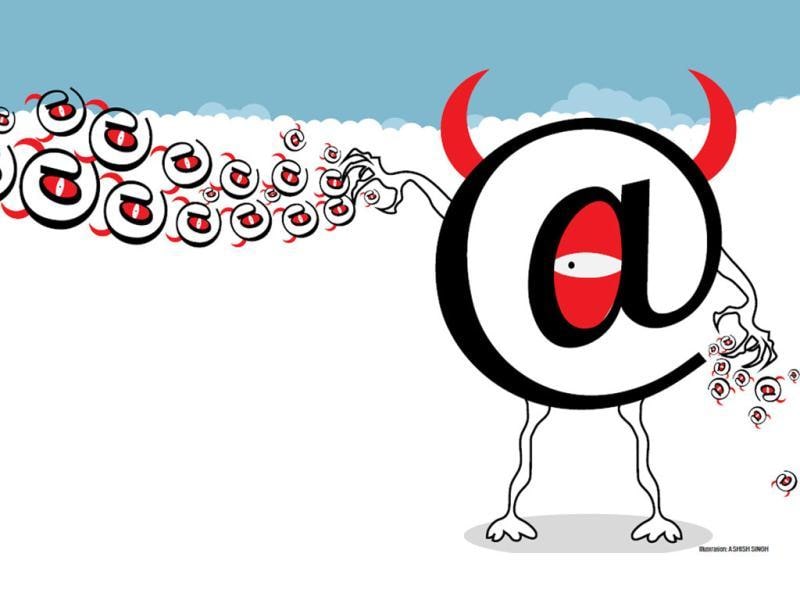Running away from the trolls
Namita Bhandare got on Twitter to connect with the world. Here she explains why she fell out of love with it.

Like a teenager in the giddy days of an early relationship, I found I couldn't get enough. I woke up with a sense of anticipation and thought about it long after I had gone to bed. Back then there was the sheer thrill of finding new people and the silly delight in knowing the 'cool' people were following me back. With 140 million active users, 10 million of them in India, I was plugged into a giant machine that gave me access to how the world and Indians think. How could I not feel euphoric?


Writer Ashok Banker, @ashokbanker, however, says he loves Twitter not as a tool to promote his books but "for its chatty interaction with people, being able to share news, tidbits, pics and info all day long and, of course, its ideal use for witty social commentary".
Sadly my infatuation came with a short use-by date. Before I knew it, I was snarling, blocking, complaining. Twitter just wasn't fun anymore.
Twitter trolls
There's another category of Twitter user. It's the dedicated party line follower. There are the Congressis, but considerably more vocal and energetic on Twitter are Hindutva loyalists. These are not politicians (Sushma Swaraj, @SushmaSwarajBJP, for instance) or journalists who make no secret about their affiliations. Oh no. These tweeters describe themselves as 'right wing fanatic', 'Modi fan' or, a bit more subtly, 'deshbhakt'. He (and the rarer she) prefers Bharat to India, though he is often located in the US and loves the words, 'paid media', 'Congressi agent' and 'Hindu warrior'. And they tweet from anonymous handles that make it easier for them to heap vile abuse.
Analyst B. Raman, @sorbonne75, an active tweeter and often a target of the 'nationalist' breed, is convinced that the Right has an organised, active presence on social media, ready to strike at what it calls the 'sickular' media. "Some of these trolls are not just lumpen elements," tweeted Raman. "They are motivated and well-organised cadres."
But trolls cut across party lines and ideology. Jiten Gajaria, @jitengajaria, a BJP Maharashtra state office bearer, says he is frequently trolled because "although I am from RSS and BJP, I am not part of the herd." Gajaria's tweets denouncing what he saw as the communal games of Congress General Secretary Digvijay Singh earned him abuse from an anonymous 'secularist', he says. "People tar the entire right wing with abusive trolls. The truth is while Right wing noise is amplified on social media, not all are abusive. We are a part of the same society as everyone else."
Not all attacks are politically motivated. Kiran Manral, @kiranmanral, says she gets a fair amount of abuse 'obscene and personal' because of her concern about child sexual abuse. "The objection was that child sexual abuse was not a topic for public discussion and that I was 'corrupting Indian sensibilities'," she says.
I first noticed both the viciousness of attack and its organised nature with what seemed to be choreographed abuse of trader Sonali Ranade, @sonaliranade. The prolific Sonali has been tweeting for the past three years as much about commodities and market trends as about random subjects that interest her: gender issues, current affairs and Narendra Modi. But, she believes, her stand that Gujarat Chief Minister Narendra Modi make amends for his handling of the Gujarat riots and rehabilitate all the victims and restore their property is what upsets the trolls the most. "The attacks are pre-planned, timed, orchestrated and executed in terms of time/topic. The sheer number of people tweeting, the number of tweets, topics and timing leave no doubt on that score," she says.
The swiftness of reaction on Twitter to news of Sachin Tendulkar's Rajya Sabha nomination seems to bolster Sonali Ranade's charge. Although Tendulkar's nomination under an 'eminent person's category' was welcomed by all parties, including the BJP, on Twitter there was an accusation among few people that he had sold out to the Congress. 'Congress lackey' and 'lousy thug' were some of the gentler epithets tossed about. Some bright spark even started an 'unfollow Sachin campaign.
More or less the same thing happened when Aamir Khan's Satyamev Jayate made its TV debut. The first episode dominated Twitter's top trends for 24 hours but the trolls were out in full force too: some wanted to know how much he was earning while others questioned his religion and his first marriage.
It's hard to explain the psychology of trolls. The worst are guided by a vile ideology of hate, hunting in packs, venomous in their rants and secure behind their anonymity. They follow each other, call out to each other and encourage each other to collectively attack a common 'enemy'. The aptly named Devil Heart ("Congies and Muzzie appeasers stay away,? ), who I had to block very early in my Twitter experience, openly spells out his strategy -- "We need to find some muzzies to bash - everyone find out Muzzies & seculars & follow them.? His co-followers include such characters as Krodhit Hindu (self-described as 'Muslim kicker, Christian basher') currently tweeting in a new avatar after an earlier one was suspended by Twitter. Other trolls are simply incensed by any attempt to criticise a well-ordered world view (India can do no wrong, there is no child sex abuse in our country, women do not get beaten up, etc). And then there's a minority that is plain annoying. Like a child desperate for attention, he or she will make caustic remarks about anything you tweet -- even if it's just the weather. Goes without saying, they have a minuscule following and tweet just to get attention. They're gambling on the odds that a Barkha Dutt, @BDUTT (with five lakh odd followers) will respond and give them their 140 seconds of Twitter fame But, points out media analyst Harini Calamur, @calamur, not everyone who has a different point of view is a troll. "There is a tendency to label people who disagree with us over a series of tweets as trolls," she says. "In my opinion, they are just being argumentative. Trolls are those who come into an argument with explicit language, hoping to scare you away or attacking you personally to score points against your views."
Happily ever after?
Today anybody with an internet connection is an instant commentator. And while tweeters can be legitimately seen as information disseminators they are not bound by journalistic compulsions to check sources, get the other side or even have the facts.
If the medium is the message, then 140 characters impose not just the discipline to be concise but the compulsion to be instantaneous. There are obvious restrictions in passing instant judgment. I know I've made thoughtless comments only to regret them. Diversity of opinion is the backbone of social discourse and one of the beauties of Twitter is to witness it first hand. We've seen the power of Twitter in the Arab Spring where protestors live-tweeted the revolution, serving as the first line of news disseminators for millions around the world. I see it on my timeline every day when someone makes an appeal for blood donation or to ask about a missing person or a recommendation for a vet for a lame horse. The general conception, largely true, is that social media is a free and democratic space that gives genuine expression to millions of ordinary citizens. In this narrative, mainstream media has sold it soul to corporate and political interests. Enough people subscribe to this view. When Press Council Chairman Justice Markandey Katju lambasted journalists for 'their poor intellectual level', he found resonance with thousands of ordinary people who hailed him as a new messiah (as with all heroes, the halo was destined to quickly lose its shine).
But when Twitter dwindles to a platform for abuse it loses its sheen. When a spoilt son famous only for his surname tweets about the character of a woman assaulted by a cricketer from his father's team, when questions are raised about the patriotism of an individual who questions Anna Hazare's motives and just happens to be Muslim, when someone says a vocal Dalit feminist should be raped, it's time to step back. Is there a way out? Not one person
I spoke to who has been trolled advocates any form of censorship. Sonali Ranade is against 'special censorship' but says that if trolls go beyond mere trolling to criminal activity (make a public call to hack people's computers, for instance), then the law must kick in. Harini Calamur points out: "All of us have opted to be in the public space by putting forth our views. To expect the world to conform to those views is wrong."
In London, 21-year-old student Liam Stacey who mocked footballer Fabrice Muama on Twitter after the midfielder collapsed during a match was jailed for inciting racial hatred. In India, a couple of defamation cases against individual tweets are pending and these could be the litmus test of how far we're willing to stretch freedom of expression on not just Twitter but also on social media. Fortunately, Twitter does offer the option to block abusive, offensive or just plain annoying followers.
For a while, I chose to answer back abuse with rebuttal. When I was accused of defending former Congress spokesman Abhishek Manu Singhvi, I asked for evidence. When another gent accused me of cronyism at page 3 parties, I clarified that I don't attend page 3 parties. When I was told I was becoming 'too personal' by commenting on a Bombay High Court judge who said married women should be like Sita, I responded: please unfollow me. Then it dawned on me. By responding to personal abuse (particularly from an anonymous source), I was becoming no better than my abusers. I was screaming back at them, using logic to rebut someone clearly interested only in getting a rise out of me. I was spending too much time in a nonsensical argument.
These days my approach is simpler: I'm all for an argument that is logical. I'm open to disagreement. But if the abuse is personal, I just block and move on. Twitter remains for me my connection to a larger world of strong opinion and wit. It's my virtual coffee house in the middle of a frenetic day. When I need the comfort of someone's wisdom in 140 characters (or need to spout my own), I switch on, plod on, less in love but connected all the same. In a way, I guess, that's how all relationships finally mature.
Namita Bhandare's Twitter handle is: @namitabhandare
Catch all the Latest Tech News, Mobile News, Laptop News, Gaming news, Wearables News , How To News, also keep up with us on Whatsapp channel,Twitter, Facebook, Google News, and Instagram. For our latest videos, subscribe to our YouTube channel.






























